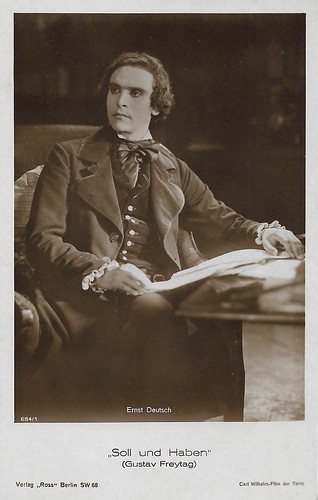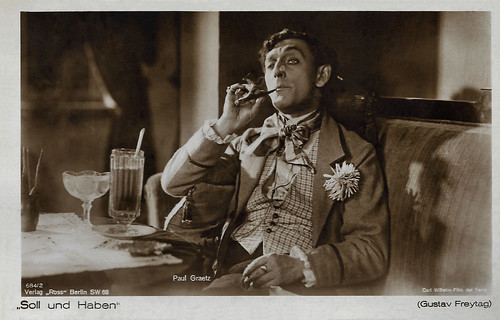
German postcard by Verlag Ross, Berlin, no. 684/1. Photo: Carl-Wilhelm-Film / Terra Film. Ernst Deutsch in Soll und Haben/Debit and Credit (Carl Wilhelm, 1924).

German postcard by Verlag Ross, Berlin, no. 684/2. Photo: Carl-Wilhelm-Film / Terra Film. Paul Graetz in Soll und Haben/Debit and Credit (Carl Wilhelm, 1924).
One of the most popular and widely read German novels of the 19th century
'Soll und Haben' (Debit and Credit, 1855) is a novel in six volumes by Gustav Freytag. It was one of the most popular and widely read German novels of the 19th century. The novel, a Zeitroman or 'social novel', deals with interactions among broad segments of German society during the 19th century. The classes represented are the mercantile or bourgeois class, the nobility, and the Jews.
In the film adaptation, young Anton Wohlfart (Hans Brausewetter) begins his professional career after the death of his father, an accountant, at his request as an apprentice in the office of the merchant T.O. Schröter (Hans Mierendorff) in Breslau. In the company, the newcomer meets a number of people such as Sabine (Olga Tschechova), the boss's sister, and another trainee Fritz von Fink (Bruno Kastner), a merchant's son.
Anton quickly makes friends with him. When he meets the young Baroness Lenore von Rothsattel (Mady Christians), Anton immediately falls in love with her. On the same day, he also meets the Jew Veitel Itzig (Paul Graetz), a former schoolmate.
Itzig is not particularly scrupulous in his methods of getting very rich very quickly. Itzig works for the Jewish merchant Hirsch Ehrenthal (Robert Garrison) and thus gets to know the once-successful lawyer Hippus (Heinrich George). Hippus' reputation has suffered badly since he became involved in crooked dealings.
Due to a lavish lifestyle, the Rothsattel family soon gets into money trouble, which Ehrenthal, Itzig and Hippus want to take advantage of. When Ehrenthal learns that Baron Rothsattel (Theodor Loos) is unable to pay his debts, he gives the nobleman some disastrous advice, which mainly benefits Ehrenthal.

German postcard by Ross Verlag, Berlin, no. 684/5. Photo: Carl Wilhelm-Film / Terra Film. Mady Christians and Hans Brausewetter in Soll und Haben (Carl Wilhelm, 1924), based on the novel by Gustav Freytag.

German postcard by Verlag Ross, Berlin, no. 684/6. Photo: Carl-Wilhelm-Film / Terra Film. Olga Tschechova, Hans Mierendorff and Hans Brausewetter in Soll und Haben/Debit and Credit (Carl Wilhelm, 1924).
A clear and lucid play of light
Things develop so tragically for the Rothsattels that the baron tries to shoot himself in desperation. He survives the suicide attempt but goes blind. Fritz von Fink decides to travel to the USA. Meanwhile, Anton supports the Rothsattel family in maintaining their newly acquired Polish estate and helps them defend it against Polish irregulars.
Fritz, who has returned from America, joins them in time to help blow up the Polish siege ring. During this eventful time, Fritz and Lenore von Rothsattel grow closer and eventually become engaged. Anton and the old Rothsattel fall out, whereupon Anton leaves the estate and returns to Schröter's Kontor.
Veitel, who is now quite wealthy, comes into serious conflict with Hippus, who tries to blackmail him, and kills Hippus in the heat of the moment. Morally broken and pursued by the police, Itzig drowns while trying to escape. Meanwhile, the account owner Schröter offers Anton Wohlfahrt to become his partner. He accepts and becomes engaged to Sabine Schröter.
The sets for Soll und Haben (1924) were designed by Robert A. Dietrich and the costumes by Ali Hubert. The film had a length of seven acts on 2758 metres and passed the censors on 15 September 1924. The film received the rating "popular education" and was released for young people. On 10 October 1924, Soll und Haben premiered in Berlin's Primus-Palast.
Oskar Kalbus wrote in ' Vom Werden deutscher Filmkunst. Part 1: The silent film' (1935): "Gustav Freytag's famous novel 'Soll und Haben' was filmed in 1924. Of course, the main motifs of the novel were taken over from the plot of the literary model into the film and only through this was it possible to create a clear and lucid play of light - although 27 actors were involved."

German postcard by Verlag Ross, Berlin, no. 684/7. Photo: Carl-Wilhelm-Film / Terra Film. Theodor Loos and Heinrich George in Soll und Haben/Debit and Credit (Carl Wilhelm, 1924).

German postcard by Verlag Ross, Berlin, no. 684/8. Photo: Carl-Wilhelm-Film / Terra Film. Aenne Roettgen, Ilka Grüning and Robert Garrison in Soll und Haben/Debit and Credit (Carl Wilhelm, 1924).
Sources: Wikipedia (German and English), and IMDb.
No comments:
Post a Comment